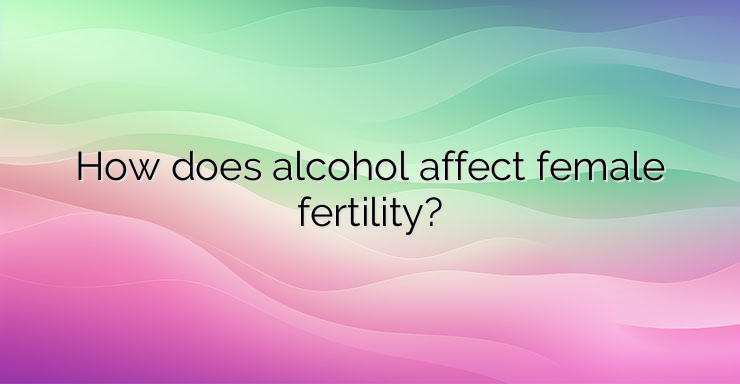Regular consumption of alcohol is not recommended during pregnancy. But even before that, women who want to start a family should refrain from consuming alcohol because it has a negative impact on reproductive abilities. Alcohol makes it difficult to conceive Alcohol consumption in the second half of the menstrual cycle is unfavorable and reduces the chances of getting pregnant, explains a study published in the journal Human Reproduction. The team of Dr. Kyra Taylor, professor of epidemiology and public health at the University of Louisville in Kentucky, looked at data from 413 women to determine possible links between alcohol consumption and the possibility of pregnancy. Moderate consumption impairs fertility The women in the study were between the ages of 19 and 41 and were followed for a maximum of 19 monthly cycles. The women reported their alcohol consumption and the type of drinks they consumed. A pregnancy test was performed at the beginning of each new cycle. Other factors that could affect fertility, such as age, concomitant and previous diseases, smoking, obesity, contraception and others, were also included in the analysis. The following alcohol consumption scale was constructed High alcohol consumption: more than 6 alcoholic drinks per week; Moderate alcohol consumption: 3 to 6 alcoholic drinks per week; Excessive alcohol consumption: 4 or more alcoholic drinks per day. An alcoholic drink corresponds to: 0.33 l of beer, 0.15 l of wine or 44 ml of liqueur. Taylor’s team found that high alcohol intake at any point in the menstrual cycle can significantly reduce the chance of conception. This is important to know because some women think it is safe to consume alcohol during certain phases of their cycle, but this is not the case. How important is quantity? During the luteal phase – the second half of the cycle, that is, when the fertilized egg will implant in the uterus, both moderate and high alcohol consumption have a negative effect. Three glasses of beer or wine a week reduces the chance of pregnancy by 40%. During ovulation – around day 14 of the cycle, high alcohol consumption reduces the chances of conception by 54%. Let’s say a healthy woman who doesn’t drink alcohol has about a 25 percent chance of getting pregnant each cycle. This corresponds to a 25 out of 100 women’s chance of becoming pregnant. If these women still consume moderate amounts of alcohol, only 20 of them will succeed in becoming pregnant. If they take excessive amounts, only 11 will get pregnant, Dr. Taylor explains. Each day that large amounts of alcohol are consumed reduces the probability of pregnancy by 16% in the luteal phase and by 35% during ovulation. How does alcohol affect fertility? Scientists have two hypotheses about how alcohol might work against conception. On the one hand, alcohol can affect ovulation,so that under its influence there are not enough eggs available for fertilization. On the other hand, it is possible that alcohol prevents the egg from implanting in the uterus. Sources: https://www.cuerpomente.com/salud-natural/alcohol-embarazo_8435 https://academic.oup.com/humrep/advance-article/doi/10.1093/humrep/deab121/6294415?rss=1


Leave a Reply